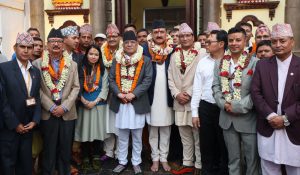In Nepal, the Maoists have been the leading force pushing to establish Nepal as a secular state, which was finally achieved on May 28, 2008. The majority of hardliner Hindus in Nepal saw this move as an official license to promote Christianity. They cite the fact that Hindu-majority Nepal has been the fastest-growing Christian country in the world since the secular state declaration. For this, they blame Maoist leader Pushpa Kamal Dahal, also known as Prachanda, who is currently serving as Nepal’s prime minister.
Because of this critical background, Dahal’s recent Hindu diplomacy means a lot – both for admirers and critics in Nepal.
Dahal’s Hindu diplomacy started in India. He visited Mahakaleshwar temple in the Indian state of Madhya Pradesh on June 2, 2023. Visiting a Hindu temple as part of his four-day official visit was an unusual choice for the Maoist leader. His first tenure as prime minister some 14 years ago was tarnished with removal of an Indian priest from Pashupatinath, the famed Hindu temple in Nepal’s capital city. Dahal diluted the cultural and religious bonds between India and Nepal with his extreme nationalist rhetoric.
In his third term as prime minister, however, Dahal is striking a different tone. His decision to visit Mahakaleshwar was all the more striking as it came before he set foot in Pashupatinath, which is within walking distance from both his personal and state residences in Kathmandu.
Dahal did eventually visit Pashupatinath on June 11, 2023. Like his pilgrimage to Mahakaleshwar, this was not an individual affair. He visited the Pashupatinath temple with his fellow cabinet members, which earned criticism from some of his colleagues.
Former Prime Minister Baburam Bhattarai, who was the second senior-most leader of the Maoists behind Dahal during the insurgency and is now a coalition partner, has criticized Dahal’s temple diplomacy. In a Facebook post, Bhattarai said, “When the Prime Minister and the entire cabinet visits a religious place together, it takes a political dimension, and naturally, questions and concerns arise.”
In another marked shift from his previous positions, Dahal stressed the importance of Sanskrit education in June 2023. Dahal’s own party used to criticize Sanskrit education during its 10-year-long insurgency from 1996 to 2006. The Maoists even torched Nepal’s lone Sanskrit-language university in 2002. After 21 years, the Maoist leader visited the same university for its fifth convocation ceremony, describing the educational significance of Sanskrit.
Dahal’s U-turn in his approach to Hinduism has both political and diplomatic undertones.
Diplomatically, he has been accused of trying to curry favor with Indian Prime Minister Narendra Modi, who is known for his Hindu nationalism. In his five visits to Nepal, Modi has made a point to visit major religious destinations such as the Pashupatinath, Muktinath, Lumbini, and Janaki temples, among others.
Modi’s approval of Dahal’s Hindu diplomacy was evident in their joint address at Hyderabad House in New Delhi on June 1. Before concluding his speech, Modi said, “Right Honorable Prime Minister Dahal-ji, you will visit Indore and the religious city of Ujjain. I am sure your visit to Ujjain will be full of energy, and you will also have a spiritual experience in this journey from Pashupatinath to Mahakaleshwar.”
In his book titled “Why Bharat Matters,” India’s External Affairs Minister S. Jaishankar defined India as the Hindu “civilizational power.” Dahal’s embrace of Nepal and India’s shared Hindu heritage would naturally be viewed with favor in New Delhi. However, its notable that Dahal also continued his Hindu diplomacy in China, which is waging a battle for influence in India’s neighborhood.
On September 28, 2023, Dahal visited the famed Hindu shrines of Mount Kailash and Lake Mansarovar in Tibet. This area is believed to be the abode of the god Shiva, and it is a pilgrimage site for Hindus.
China has been playing up its connections to Hinduism as well as Buddhism through its Global Civilization Initiative. Thus it is diplomatically advantageous for Dahal to support that initiative by visiting China’s sacred Hindu sites.
However, Dahal’s Hindu diplomacy is not primarily motivated by foreign policy calculations, whether regarding China or India. Instead, his change of heart stems from his compulsion to maintain political relevance in Nepal’s competitive power plays.
By making public displays of respect for Hinduism, Dahal hopes to increase his vote share among Hindus, who account for 81 percent of Nepal’s population. Dahal desperately needs to shore up support in order to improve upon his party’s current third-place position in Nepal’s lower house in the upcoming elections.
Dahal has seen the increasing currency of Hindu votes for other parties, mainly the openly Hindu monarchist party RPP, the fifth largest party in Nepal’s Parliament. He wants to grab some section of these Hindu votes.
For the three-time prime minster, losing ideology is easier than losing his hold in power. Therefore, he is openly wooing Hindu constituencies of Nepal despite a long track record of championing secularism as the Maoist chief. As Dahal himself put it upon his return from India Kathmandu on June 3, 2023: “I am not just a communist; I am also the prime minister.”
In that sense, Dahal may indeed be taking inspiration from Modi – but not in the foreign policy sense. Instead, Dahal wants to emulate Modi’s track record of resounding election victories by copying his pro-Hindu playbook.

































